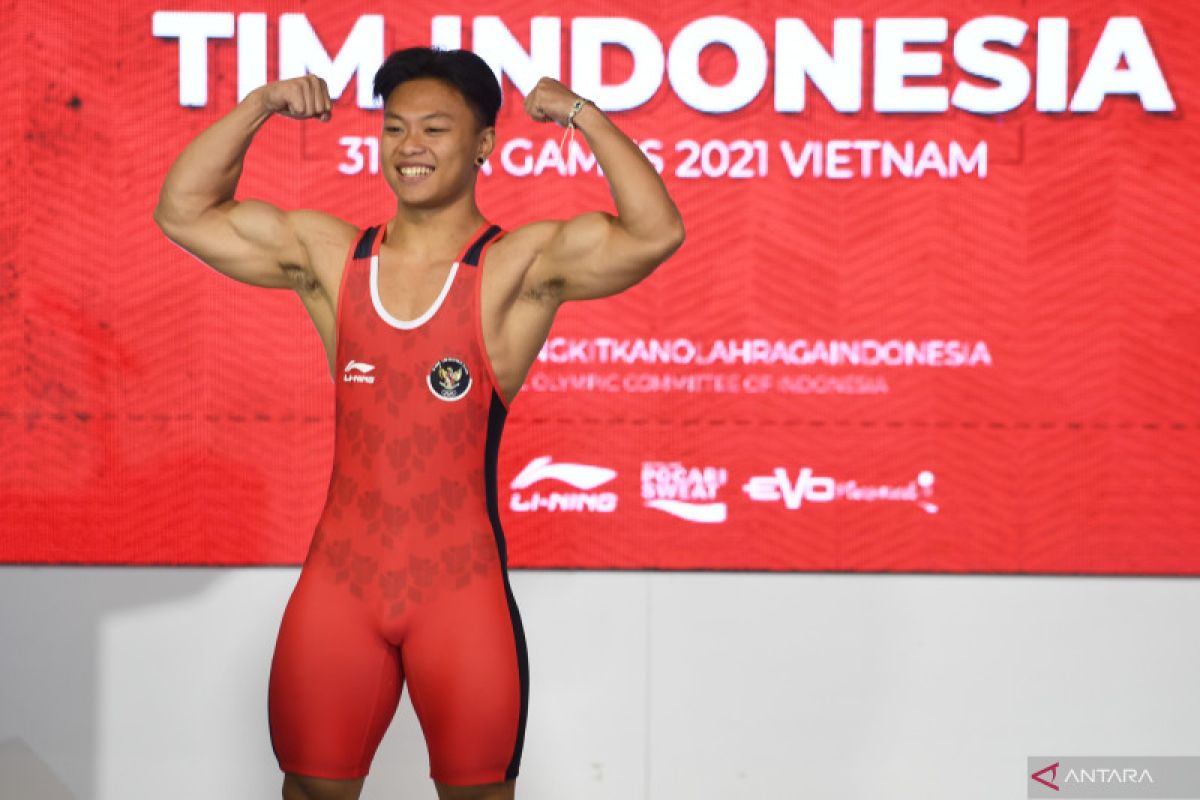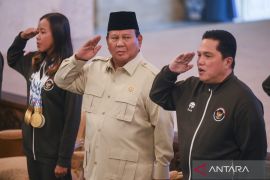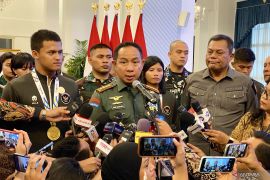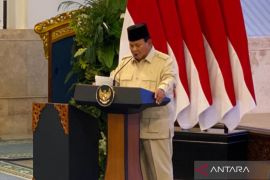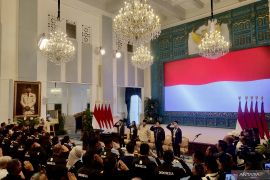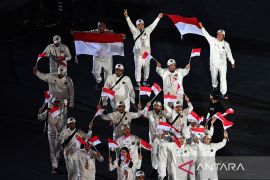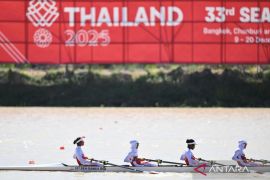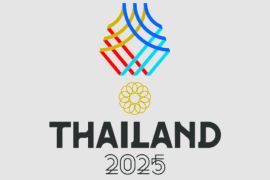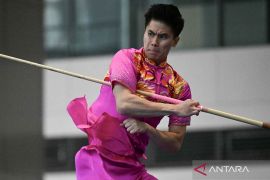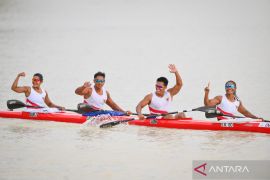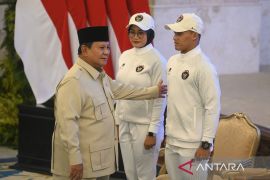The contingent is assessed to potentially bag medals from the 32 sports at the biennial international sporting event.
Some of them are included as priority sports in Indonesia’s national sports achievement improvement plan called the Great Design of National Sports (DBON).
They are weightlifting, athletics, cycling, badminton, canoeing and rowing, karate, shooting, archery, pencak silat, swimming, gymnastics, taekwondo, as well as wushu.
Meanwhile, Indonesia will compete in boxing, volleyball, bowling, chess, jujitsu, judo, tennis, triathlon, sepak takraw, kickboxing, soccer, esports, fencing, basketball, wrestling, diving, vovinam, golf, and futsal at the 31st Hanoi SEA Games despite them not being included as priority sports.
Earlier, Indonesia had only planned to dispatch 476 athletes to compete in 31 sports.
Nonetheless, with the additional number of athletes, the figure is lower than the total number of athletes from other countries, such as Vietnam, with 965 athletes; Thailand, 871 athletes; the Philippines, 656 athletes; and Malaysia, 612 athletes.
In fact, almost all participants of the 31st Hanoi SEA Games have reduced the number of their representatives.
However, Indonesia is one of the countries with the largest reduction since it only dispatches about 60 percent of the total 837 athletes that had competed in the 2019 SEA Games in the Philippines.
Despite dispatching quite a huge number of athletes to compete in 56 sports, Indonesia had finished fourth in the 2019 SEA Games medal standings, with 72 gold, 84 silver, and 111 bronze medals.
The international sporting event was dominated by Thailand and Vietnam in the last 10 years, as they always manage to finish in the top three in the final medal standings.
This is despite the fact that in several other parameters, Indonesia ranks above the two other Southeast Asian countries.
For instance, Indonesia's area of 1.9 million square kilometers (km) is almost four times bigger than Thailand’s and six times larger as compared to that of Vietnam.
The country also has the largest population in Southeast Asia, reaching around 270 million. It is almost four and three folds larger than Thailand and Vietnam’s population respectively.
In addition, according to the World Bank, Indonesia’s gross domestic product (GDP) in 2020 of US$1.05 trillion was two folds higher than Thailand’s GDP and three folds higher as compared to Vietnam’s GDP.
On account of those aspects, Indonesia becomes the only Southeast Asian country included in the G20 and currently holds the presidency of the forum.
Related news: President officially dispatches Indonesian team for Hanoi SEA Games
Intermediate target
International events, such as the G20 and SEA Games, often become the showcase of a country’s greatness and leadership among members of the global community.
Furthermore, the events serve as a stage to exhibit a nation’s achievements to the world.
In particular, regarding a sporting event, the size of a country’s contingent is often associated with its national capabilities.
However, during the 31st Hanoi SEA Games, Indonesia seems to be striving to break such symbolism. The country’s participation in the sporting event aims to improve the quality of its athletes, as emphasized by the government.
Youth and Sports Minister Zainudin Amali also noted that the participation intended to demonstrate Indonesia’s solidarity with the host and the Southeast Asian sports community as the surge in COVID-19 cases had postponed the implementation and limited the budget for preparation of the event.
Thus, the 31st Hanoi SEA Games is only an intermediate target in fostering national sports achievements and an evaluation to prepare for the 2022 Hangzhou Asian Games, he emphasized.
However, he expected that all of the representatives dispatched to the SEA Games must bag medals.
Hence, the international sporting event can be regarded as a starting point in changing the paradigm of athlete selection for international multi-sport events as the minister has said that the selection will be conducted more thoroughly by using measurable parameters according to the analytical data.
It means that the focus is only on sports and athletes that can win medals to be dispatched in the next international sporting event.
The attempt aims to improve the standards for sports development in Indonesia. Currently, it places the achievement at the Olympics as the main target, while the SEA Games and the Asian Games are only intermediate targets.
Related news: Athletes selected for SEA Games should secure medals: Minister
Ensuring a sustainable application
In fact, amid the last 11 editions of the SEA Games, a huge number of athletes did not guarantee that Indonesia will finish at the top or even at the second place of the final medal standings – except at the 2011 Jakarta and Palembang SEA Games when Indonesia became the champion of the edition.
This is despite the fact that since its first participation in the 1977 Kuala Lumpur SEA Games, Indonesia had almost always topped the medal standings until the 1997 Jakarta SEA Games -- except in the 1985 Bangkok and 1995 Chiangmai SEA Games -- when Indonesia secured the second place.
By dispatching smaller number of athletes, the government has decided to not be too ambitious, as the contingent is only targeted to reach the fourth place at the event.
The government had chosen the athletes’ quality over quantity based on their track record and achievements, and the attempt should be lauded.
Nonetheless, the sustainability of the attempt must be ensured to be in accordance with all sports competitions and development programs at the national level, so all sports stakeholders in Indonesia will uphold quality above all.
It must be applied at upstream competitions -- which include the National Sports Week (PON) and other national championships -- as well as in downstream events, such as the SEA Games, Asian Games, Olympics, and various international championships.
Thus, by consistently implementing this step in upstream competitions, the quality of the selected national athletes can be guaranteed to be able to record achievements in international events.
The new paradigm should be developed into a culture and applied in the SEA Games. Hence, the elimination of certain Olympic sports or events can be prevented, while the introduction of new non-Olympic sports or event will become measurable and not solely seem as an attempt to increase the achievement of medals.
Indonesia must prove that it is seriously implementing the new paradigm through its achievement at the 31st Hanoi SEA Games.
Regardless of the final achievement of the contingent, quality-oriented sports development must be Indonesia’s new standard in fostering its athletes and implementing any national competition, including PON.
Related news: SEA Games: Emilia Nova to be first Indonesian woman flag bearer
Related news: SEA Games: PBESI to award Rp7-bln bonus to gold medalists
Editor: Suharto
Copyright © ANTARA 2022
